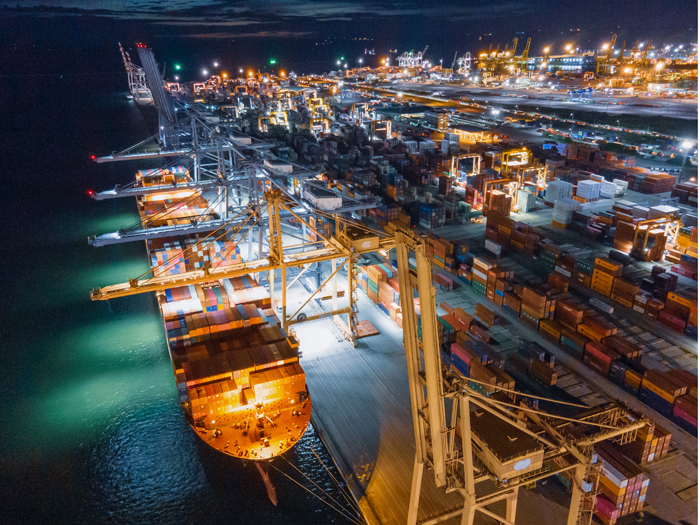As Global Tensions Continue to Rise, How Will Supply Chains Fare?

As the conflict in Ukraine continues to unfold and the world anxiously awaits a peaceful resolution, the effects of Russia’s aggressions are reverberating around the globe.
Tremendous damage has already been incurred, both in terms of human life and physical infrastructure. Thousands of civilian and military lives have been lost in the ongoing warfare.
Additionally, an estimated $63 billion worth of Ukrainian infrastructure was also destroyed or damaged in the first five weeks of fighting, ranging from residential housing, schools and hospitals to power plants, factories, roads, bridges and agriculture production.
The extent of the damage has caused the U.N. Conference on Trade and Development (UNCTAD) to slash its global economic growth projection for 2022 to 2.6% from its prior 3.6% projections.
Impacts of Sanctions & Shortages
The destabilization and devastation have caused unanticipated and indirect disruptions to the global supply chain, which was already vulnerable after the last two years of pandemic related issues. Economic sanctions may further exacerbate this risk if precautions are not implemented.

Les Williams, chief revenue officer, co-founder, Risk Cooperative
In fact, coupled with the voluntary cessation of business dealings from corporate entities, the multitude of trade bans imposed on Russia by nations around the globe has already stymied key areas of the supply chain.
Reuters has been tracking the wide array of sanctions imposed by more than 30 countries thus far.
Hundreds of billions of dollars have effectively been cut off from the Russian economy, and this figure is expected to grow for the foreseeable future.
The Russian stock market was closed for almost a month, the global assets of Russian oligarchs continue to be seized, and shipping giants MSC and Maersk have suspended all cargo bookings to and from Russia, except for non-essential goods like medicine and humanitarian goods.
The culmination of all these factors has impacted the flow of critical resources produced in the region.
Production of sunflower oil, of which Ukraine produces roughly 46% of global consumption, has been largely halted. As a key alternative to palm oil, this disruption is causing both price surges and eroding progress made combating deforestation due to palm oil production throughout much of Southeast Asia.
Production of wheat has also slowed, a third of which is grown in the region, causing significant price increases of roughly 30% across global markets.
Unfortunately, this type of strain on critical resources will further destabilize the global economy, and potentially governments, in other emerging markets.
As the world economy continues to see soaring inflation and recovery from COVID lingers on, any undue economic pressures can ignite mass discontent amongst already-strained populations. It’s a clarion call for global companies to revisit their supply chain diversification strategies and rethink how to utilize political risk insurance as a risk management strategy.
Revisiting Political Risk Insurance
The last few years have tested the resiliency of the global economies. As nations adapted to operating in a post-pandemic world, supply chain vulnerabilities were top of mind. However, the Russian invasion of Ukraine has emphasized there are still geopolitical risks that can severely disrupt the highly interconnected global economy.
There is much more work needed to diversify and reinforce the global supply chain.
The disruption of core food staples and resources, and the resulting price surges, are pushing global populations to the brink. Corporations must take stock to help maintain operations and keep costs attainable, as public sentiment is weary of further price increases after seeing firms register record profits during the pandemic.
Firms have been too complacent in terms of risk analysis, assuming established markets like Russia would remain overall stable with minimal risks to business operations.

Andres Franzetti, CEO and co-founder, Risk Cooperative
However, the type of political risk we are seeing now in the region is becoming the norm in an increasingly polarized and unstable world.
Corporations and governments alike need to apply lessons learned from the pandemic and current crisis to bolster and diversify their production. Mitigating these types of business risks is a critical element that must be considered going forward across all markets.
Corporations that did not leverage risk mitigation tools and can no longer do business due to trade embargos, sanctions, or expropriated assets will have to account to shareholders for the sizable losses on their P&L.
Risk transfer tools like political risk insurance are available and can help offset some of the financial losses incurred due to sanctions or nationalized assets, however they have traditionally only been applied in what were deemed “extremely high-risk regions” or corruption within government regimes.
Witnessing the abrupt shift in Russia’s foreign business attitude provides clarity on the broader application for this type of insurance.
Insurance Alone Is Not the Solution
Proactive risk management must become part of every operation’s business framework. From using insourcing and supplier diversification to insurance and other risk transfer solutions, both firms and governments need to leverage every tool available to build resiliency.
With Russia “extricated” from the global supply chain in a matter of weeks, countries are having to quickly adapt to fill the gaps in this this broken chain.
Germany just signed an agreement with Australian based E.ON to begin importing nearly five million tons of green hydrogen energy to help wean itself off Russian natural gas dependence. The U.S. has also stepped up production efforts to fill the gap by ramping up shipments of gas to the region throughout the end of the year and into 2023.
Other new market entrants will continue to appear to fill the voids, however it will take significant time for these efforts to reach scale.
In the interim, organizations and governments alike will need to find quick alternatives and remain agile to ensure there is not further threat to political stability in their respective regions.
The auto industry created a playbook during the pandemic that other industries should follow, rewriting the “just-in-time” manufacturing ethos to finally utilize multiple suppliers for critical auto parts to keep car assembly lines moving. Organizations must start leveraging this type of playbook based on the realization that the Ukraine-Russia conflict is not a Black Swan, rather the new operating reality with encores expected to follow. &










